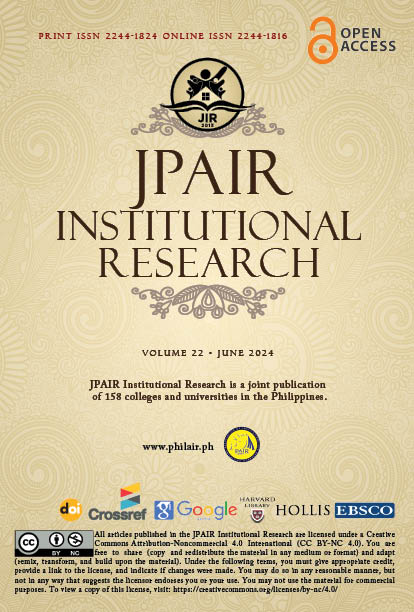Laboratory Facilities as Predictors of Academic Performance among Maritime Students
DOI:
https://doi.org/10.7719/irj.v22i1.882Keywords:
Maritime education, laboratory facilities, seamanship lab, bridge simulator, chart room, serviceability, instructor expertise, academic performance, quantitative research, policy development, PhilippinesAbstract
This study investigates the influence of laboratory facilities on maritime students' learning and extent of delivery of instruction at the Merchant Marine Academy of Caraga Inc. It emphasizes the need for improvements to align with industry requirements and prepare students for future challenges. The research examines the impact of specific facilities like the seamanship lab, bridge simulator, and chart room. The researchers used a quantitative approach to gather data from maritime students and instructors through surveys. The analysis focused on the serviceability of the labs in terms of equipment availability, maintenance, and safety standards. The justification for the research is further supported by the findings, which indicate that most facilities are in good working order, with serviceability ranging from 77% to 87%. Interestingly, the study highlights that instructor expertise is just as important as the facilities themselves. It emphasizes that instructor experience and teaching methods significantly impact student learning, suggesting a need for investment in instructor development alongside improvements to the laboratories. In conclusion, the abstract justifies the research by demonstrating that laboratory facilities are important for maritime student learning and that there is a need for improvement in order to prepare students for the challenges of the maritime industry. The abstract outlines a methodology to investigate this and presents preliminary findings that justify further research.
References
Barth, B., Arutiunian, A., Micallef, J., Sivanathan, M., Wang, Z., Chorney, D., ... & Dubrowski, A. (2022). From centralized to decentralized model of simulation-based education: curricular integration of take-home simulators in nursing education. Cureus, 14(6).
Baumler, R., Arce, M. C., & Pazaver, A. (2021). Quantification of influence and interest at IMO in Maritime Safety and Human Element matters. Marine Policy, 133, 104746.
Bhandari, P. (2020). An introduction to quantitative research. SCIRP. https://www.scirp.org/reference/referencespapers.aspx?referenceid=2741841
Downloads
Published
Issue
Section
License
Copyright (c) 2024 Ernesto Berro, Romeo Calonia, Jao L. Alastra, Justine D. Asis, Ahleckz S. Cayao, Ruel P. Rendon, Judie T. Sozalo, Rey F. Remitar

This work is licensed under a Creative Commons Attribution-NonCommercial 4.0 International License.












